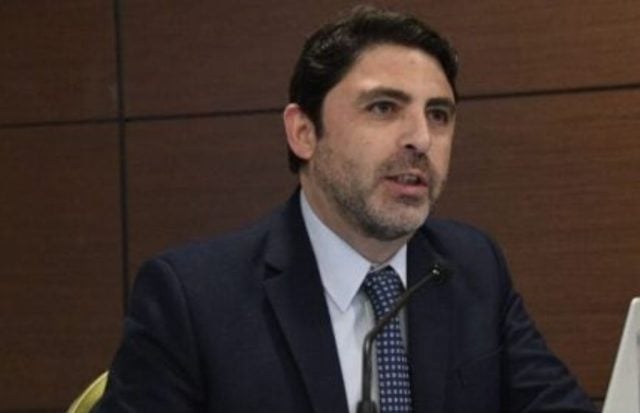In a major turn in the case, former judge of the Second Tax and Customs Tribunal (TTA) of the Metropolitan Region, Óscar Meriño Maturana, was arrested Tuesday on charges of aggravated bribery. The arrest, ordered by prosecutor Jaime Retamal of the Centro Norte Prosecutor’s Office, contrasts with an administrative inquiry that last year confirmed irregularities but imposed only a four-month suspension after failing to prove personal financial gain.
The arrest took place at 1:45 p.m. in the Colina district, according to Public Prosecutor’s Office information reported by CIPER. Meriño will remain in custody until Wednesday, when he is due to appear for a detention control hearing and subsequent formal charging over his alleged role in a scheme to handpick court experts in exchange for payments.
Two-track investigation: administrative review and criminal probe
Meriño’s case has unfolded along two parallel tracks. On one side, an administrative proceeding led by judicial prosecutor Daniel Calvo at the Santiago Court of Appeals concluded last year that the judge had appointed experts in an «arbitrary and irregular» manner in at least ten cases handled by the Second TTA in Santiago between 2018 and 2021.
The experts most frequently tapped in those disputes were Teresa del Pilar Gaete Navarro, Sergio Castro Rivero, and José García Donoso.
The administrative probe could not establish that Meriño received bribes to secure those appointments, clearing him of having personally profited.
However, Calvo’s report found the appointments occurred amid «multiple questionable bank transactions by Judge Meriño, whose sustained repetition suggests a pattern of conduct that goes beyond mere error or oversight and undermines guarantees of a fair and impartial judicial process.»
Although Meriño argued the transactions were tied to rent payments from eight apartments he owns in Colina—leased to migrants for between $120,000 and $130,000 a month—the 74-page ruling noted «multiple money transfers and financial movements» by the judge whose origin and justification «have not been fully clarified,» CIPER reported.
Among those movements were transfers totaling $18.8 million from the Mejías San Martín company—owned by his mother and brother—to whom he issued fee invoices for «unspecified services»; plus $3.3 million sent by his partner, Auddy Graterol Rivero, who in turn had received funds from one of the experts appointed by Meriño.
There were also transfers to his brother amounting to $118 million, and to his court assistant for $4.5 million. In addition, deposits from unidentified third parties totaled $30 million.
Despite the gravity of these findings, the full bench of the Santiago Court of Appeals suspended Meriño for just four months. A minority of justices sought to elevate the case to the Supreme Court to open removal proceedings, but the effort failed.
Meanwhile, the criminal investigation led by prosecutor Jaime Retamal remained active. It began with an anonymous complaint alleging the judge and other court officials accepted payments to appoint specific experts in cases under their review. Unlike the administrative process, the Centro Norte Prosecutor’s Office probe culminated in the arrest of Óscar Meriño on aggravated bribery charges.
The probe also targeted three other officials at the Second Tax and Customs Tribunal in Santiago and spanned the past five years, covering at least 50 cases handled by the Second TTA in the Metropolitan Region.
Those 50 proceedings share a common thread: accounting expert reports in cases involving taxpayers with large outstanding tax debts—an exceptional step given the high cost of such audits.
It also emerged that external individuals were used in these reports, and across the 50 cases at least five experts appeared repeatedly—raising red flags given that assignments are supposed to be random to prevent the same specialists from being selected over and over.
Supreme Court removed Meriño over poor performance ratings
In March of this year, the Supreme Court removed Óscar Meriño from the Second TTA in the Metropolitan Region. The decision was not directly tied to the bribery scandal; instead, it cited his having received a score below 3.0 on two consecutive evaluations.
The process followed ratings on a seven-point scale, where he received a 2.9—his second straight «deficient» evaluation with a score below 3.0.
As El Mostrador reported, seeking to overturn the poor rating, Judge Óscar Meriño filed a constitutional protection appeal against Justice Romy Rutherford, who had proposed a score of 2.7. The move failed, and his removal from the Santiago Tax and Customs Tribunal was finalized on March 5.
The Supreme Court’s full-bench resolution was then communicated to the regional administration of the Judicial Branch’s Administrative Corporation, the Ministry of Justice and Human Rights, the Competitions Office and the Ratings Office of the Court of Appeals; as well as to the Administrative Unit of the Tax and Customs Tribunals and the Public Procurement Tribunal, the Ministry of Finance, and the Second Tax and Customs Tribunal of the Metropolitan Region.


